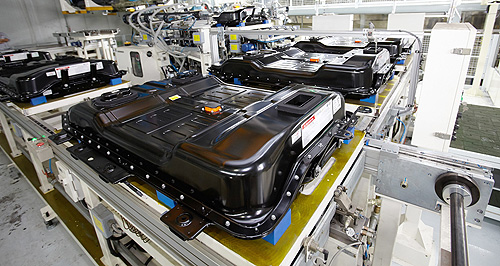Make / Model Search
News - General News - ManufacturingAustralia ‘ready for low-emissions R&D role’Research centre: The federal Labor Party reportedly has been planning a $1 billion manufacturing fund to support industry, including the automotive sector. FCAI points to world-class engineering industry as route into EVs, hydrogen10 Apr 2019 AUSTRALIA’S peak automotive industry body says the local automotive industry is “without doubt” ready and capable to take on a major role in the global development of low-emissions vehicles.
Responding to an ABC News report that the federal Labor Party was preparing to announce an election promise to offer tens of millions of dollars to motor companies to resurrect the Australian car industry around electric and hydrogen-power cars, Federal Chamber of Automotive Industries (FCAI) chief executive officer Tony Weber said a lot of work would need to be done to bring mass automotive manufacturing back to Australia.
“I would say never say never,” he said “There is obviously a lot of capacity in the Australian innovation system and a lot of experience around manufacturing.
“So, you would never discount anything, but we saw the demise of manufacturing in this country sadly in 2017 and a lot of work would need to be done to bring the industry back to Australian shores.
“But people forget that Australia still has a very active role in the automotive sector, through the research and development and engineering activities that are undertaken here in Australia. Really important research.”
Mr Weber pointed to the likes of Ford, Holden and Toyota – all of which retain design and engineering departments in Australia – as examples of the Australian automotive industry in the post-manufacturing era.
“We have people in the car companies with world-class skills and experience actually doing developmental work and research for the automotive industry,” he said.
“So that is a very strong basis. Obviously as technology is becoming more and more sophisticated, the research and development elements of the industry are more and more important and Australia has a really key role to play.”
The ABC reported that the Labor Party had been working quietly on its automotive plan for the past couple of years, “with high-ranking executives from the United States travelling to Australia to discuss ‘co-investment’ options with Opposition figures”.
“It is understood Labor plans to offer major car-makers research and development grants from a $1 billion fund aimed at re-stocking Australia's manufacturing sector,” the ABC said.
“Labor wants 50 per cent of all new car sales to be electric vehicles by 2030 and it believes many of them should be built in Australia – potentially using repurposed car factories in South Australia and Victoria.”
As most of those factories have already been sold or put to other uses, it would be hard to see how that would be possible.
However, independent senator for South Australia Tim Storer, who chaired a senate committee on EVs, welcomed the unannounced Labor plan, saying: “We have all the natural and human resources needed to build EVs here in Australia.
“We are already the world’s biggest lithium exporter, and still have a skilled car manufacturing workforce that can be re-engaged. It doesn’t make sense for us to be shipping off raw materials needed to make EVs, only to buy them back as finished products.
“I want to see more of the value of our resources captured here in Australia. We have a huge economic opportunity, and we’re currently squandering it. It’s clear that EVs are the future. The question is do we want to be technology takers, or technology makers?”
Mr Weber said the Australian automotive industry – backed by a highly skilled university sector – would “without doubt” be ready, willing and able to transition to low-emissions vehicle development.
“Australia has enormous skills in a whole raft of areas, and we have experience in bringing those skills together from the university sector and the car companies here in Australia,” he said.
“That has been very fruitful in the past and as technology evolves, we will remain at the forefront of those technologies internationally. That will move obviously to automated and connected areas – has moved to those areas – and it will also move to low-emission technologies.”
But Mr Weber warned that the Australian auto industry operated in a competitive international environment.
“This is highly desirable activity that has enormous spill-over benefits to the broader economy and other sectors of the economy,” he said.
“Governments around the world recognise that. Australia still remains the envy of the world in terms of our innovations system and other governments would be absolutely delighted to take a bigger slice of the pie.
“It is important that Australia stays at the forefront of R&D in all sectors of the economy, including automotive.”
Labor leader Bill Shorten hinted at the plan for a car industry boost when he tweeted: “Unlike the Liberals who waved goodbye to the car industry, Labor backs Australian manufacturing.”
In his budget reply speech, Mr Shorten said he wanted Australia to use its vast natural resources of lithium to create an Australian battery industry.
“So instead of the usual trope of shipping the minerals overseas and buying back the finished product at vastly inflated prices, let's make the batteries here,” he said. “And let's do this with electric vehicles and charging equipment and stations too.”
Several small-scale manufacturers are already in various stages of preparing to build EVs in Australia. Queensland company ACE Electric Vehicles is building an electric van pitched at small businesses and companies, with a goal of 100 to be built this year in its Brisbane factory.
Another is SEA Electrics which says it will build up to 5000 electric vehicles a year from a plant at Morwell, in Victoria’s Latrobe Valley.
In Adelaide, Precision Buses has started building trial electric buses for the South Australian government.  Read more |
Click to shareGeneral News articlesResearch General News Motor industry news |












Facebook Twitter Instagram